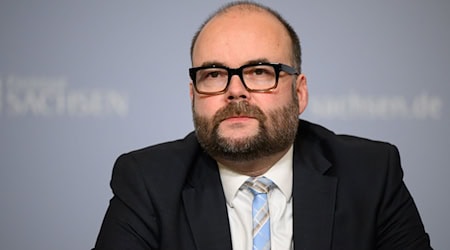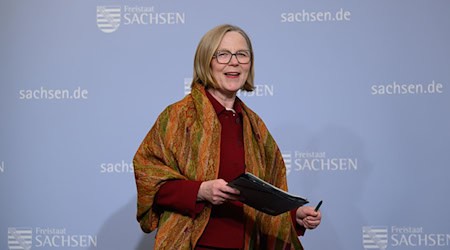In Saxony, the CDU and SPD have agreed on a 110-page coalition agreement. Minister President Michael Kretschmer (CDU) and Saxony's SPD leader Henning Homann presented the agreement in Dresden. However, the members of both parties still have to approve the coalition agreement.
CDU and SPD parties form a minority government - in order to pass resolutions or enact laws, they lack 10 votes, so they have to get MPs from other parties on their side.
Kretschmer, who wants to be re-elected as Minister President before Christmas, emphasized that the things that have been agreed are to some extent subject to a budget proviso. He spoke of an "impressive piece of work". A selection of the most important points:
Agreement on the budget
The draft budget should be ready by March, and the Black-Red coalition wants to reach a decision in the state parliament by the summer. According to Kretschmer, the aim is to overcome a "financial emergency". More money is to be made available through small payments into the generation fund, with which the Free State secures the future pensions of civil servants. The allocations are to be reduced by 270 million euros per year to enable investments in other areas.
Savings are also to be made for the current 96,000 employees of the state administration. An additional financial cushion is to be created by stretching the debt from the time of the coronavirus pandemic. The CDU and SPD also want to draw on the budget equalization reserve.
A special fund, the so-called Saxony Fund, is intended to strengthen digital administration and the transformation of the economy by investing in state infrastructure.
A "Sachsengeld" is also planned to make it easier to buy the first owner-occupied residential property.
Asylum and migration
CDU and SPD want to limit irregular migration. Among other things, rejected asylum seekers from safe countries of origin should be able to be deported directly from initial reception facilities. This should relieve the burden on local authorities.
According to the Black-Red coalition, border controls at Saxony's external borders are also to be made more permanent and a payment card system for asylum seekers is to be introduced throughout the state. In addition to speeding up asylum appeal proceedings at administrative courts, the plans also include a Saxon pilot project for people who are required to leave the country - in future, they are to leave the state more quickly. To a certain extent, this involves testing an exit center.
Police and internal security
The police force is to be increased from just under 14,600 to around 15,000 officers by the end of the legislative period in 2029. Additional officers are to be deployed primarily as citizen police officers in rural areas or to reinforce police stations.
Both parties are also in favor of establishing a Saxon border police force. "Our aim is to reduce border crime and smuggling offenses," they say. The police are also to be given more powers: According to the coalition agreement, the use of bodycams in homes and private rooms is to be examined, as well as temporary legal bases for preventive powers of source telecommunication surveillance - in the event of a risk of terrorism or to prevent the most serious capital crimes.
Education and culture
CDU and SPD want to make the last year of nursery school compulsory and free of charge in order to make it easier for children to start school and to even out differences in performance levels. According to Kretschmer, the costs for this are in the three-digit million range.
From January 2027, the agreement states that there will be three days of qualification time for voluntary work and careers. In this way, the black-red coalition wants to take into account the popular motion calling for five days of training time for employees.
Ministries
The future government wants to reduce the number of ministers from 11 to 10 and the number of state secretaries from 15 to 11. The CDU chairman Kretschmer emphasized that they wanted to set an example in these special times.
According to the agreement, the CDU will retain the Ministries of the Interior, Finance, Justice and Culture as well as the State Chancellery. Agriculture and the environment and a newly created Ministry of Infrastructure will also be added. The ministries for science and culture and tourism will be combined into one ministry and will also remain in the hands of the CDU.
The SPD will continue to hold the Ministry of Social Affairs and the Ministry of Economics as before.
Timetable and election of the Minister President
The SPD state executive will discuss the results on Thursday, while the leadership of the CDU in Saxony will meet on Friday evening. The SPD's approval of the coalition agreement is dependent on a member vote. This is due to start in the next few days and the result is expected to be available at the end of next week.
The CDU will put the coalition agreement to the vote at a party conference on December 14. State parliament sessions will take place on December 18 and 19. Although an agenda has not yet been set, the election of the Minister President would then be possible.
The CDU and SPD have been negotiating the formation of a minority government since mid-November. As they are ten votes short of a majority in the state parliament, they have announced a so-called consultation mechanism, which aims to involve the opposition - including the AfD - in legislative proposals at an early stage.
Copyright 2024, dpa (www.dpa.de). All rights reserved










